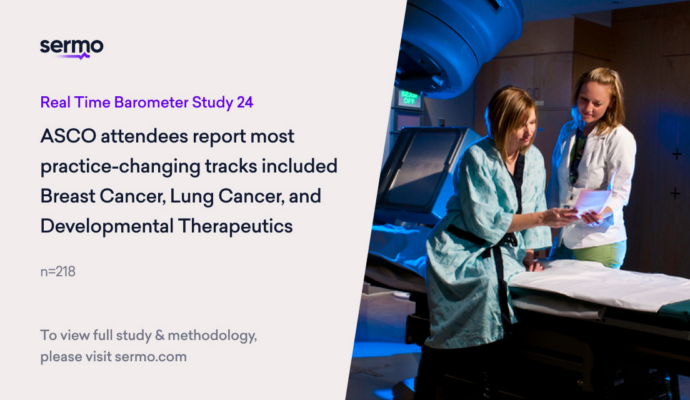With ASCO’s Focus on Healthcare Equity, 31% of Oncologists Advise the Best Solution to Address the Lack of Diversity in Clinical Trials is Creating a Network of Trial Sites in Underserved Communities
New York, NY – Today, a new barometer survey from Sermo, a physician-first online community and leader in global HCP insights, timed to the conclusion of the annual American Society of Clinical Oncology (ASCO) conference found that the tracks oncologists found the most practice-changing were breast cancer (58%), lung cancer (34%), and developmental therapeutics – molecularly targets agents and tumor biology (32%). Among the breast cancer tracks being followed at ASCO, the DESTINY-Breast04 abstract was the most highly attended with 79% of the surveyed oncologists who were interested in breast cancer data attending this abstract. 43% of oncologists found the data presented in the abstract to be meaningful to their treatment decisions.
In terms of treatment data being presented at ASCO, data relating to tumor targeting antibodies and adoptive cell therapies were the most interesting among oncologists. When asked what treatment data presented at the conference they found very interesting, 59% of surveyed oncologists found tumor targeting antibodies very interesting. Other data being presented at ASCO that were of significant interest to oncologists included adoptive cell therapies data as reported by 58% of oncologists, immune effector cell modulators co-inhibitory antagonists as reported by 54% of oncologists, and immunogenic cell death inducers (radiotherapy and chemotherapy) as reported by 45% of oncologists.
ASCO continues to be a leading educational event for oncologists worldwide, with 89% of oncologists surveyed reporting that they followed this year’s conference in real-time in some capacity. However, how oncologists attended this year varied greatly. Many oncologists are still preferring virtual options for conferences as 39% of oncologists surveyed reported that they attended ASCO virtually this year. The most popularly attended sessions/activities by surveyed oncologists who attended ASCO were education sessions (70%), oral abstract sessions (54%), the opening session (51%), clinical science symposium (42%), and poster discussion sessions (42%).
Additional Insights on Driving Diversity in Clinical Trials
Additionally, 31% of oncologists surveyed felt the best solution to address the lack of diversity in clinical trials is to create a network of clinical trial sites in underserved communities. This was followed by 17% of oncologists surveyed feeling that the best solution is to mandate patient recruitment requirements, and 14% responding that developing a diverse pool of investigators and staff is the best solution.
A Look into How Oncologists are Now Treating Patients Affected by Covid-19
Oncologists are overwhelmingly turning to Paxlovid as a treatment option. 84% of surveyed oncologists said they are recommending Paxlovid to their oncology patients if they test positive for Covid-19. However, barriers to accessing Paxlovid still exist. 18% of oncologists surveyed reported the reason they aren’t prescribing Paxlovid is that it’s too hard for patients to find the medication.
Among reasons oncologists were choosing not to prescribe Paxlovid to patients included:
- Paxlovid isn’t the only Covid-19 treatment oncologists are interested in prescribing to patients. 29% of oncologists who reported they aren’t prescribing Paxlovid to patients, said it is because they are prescribing molnupiravir instead.
- Paxlovid efficacy concerns exist among oncologists. 1 in 5 oncologists (21%) who reported that they aren’t prescribing Paxlovid said it was because they aren’t confident in the efficacy profile.
- Medication interactions also played a role in oncologists not prescribing Paxlovid to patients as reported by 12% of oncologists surveyed.
About the barometer:
This survey was fielded as part of Sermo’s ongoing Real Time Barometer as a special edition timed to the annual ASCO conference. The survey included 218 oncologists and oncologists/hematologists in the US and EU5 between June 10-15, 2022.
To explore more findings from Sermo’s latest Real Time Barometer, visit app.sermo.com/covid19-barometer.
About Sermo:
Sermo turns physician experience, expertise, and observations into actionable insights for the global healthcare community. Engaging with more than 1.3 million HCPs across 150 countries, the company provides physicians with a social platform and unique community that fosters impactful peer-to-peer collaboration & discussions about issues that are important to them and their patients. Sermo offers on-demand access to physicians via a suite of proprietary technology to provide business intelligence that benefits pharmaceutical, healthcare partners, and the medical community at large. To learn more, visit www.sermo.com
Media Contact:
Allyson Noonan
allyson.noonan@gmail.com
